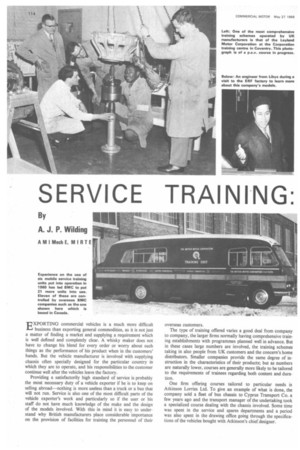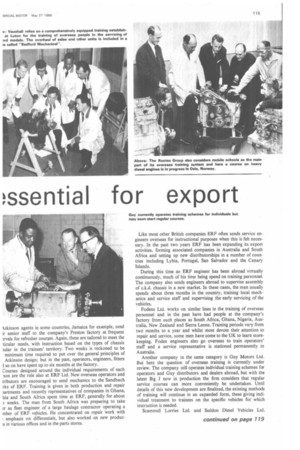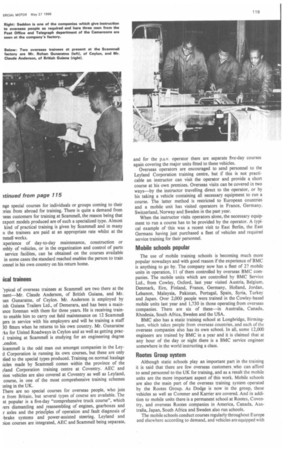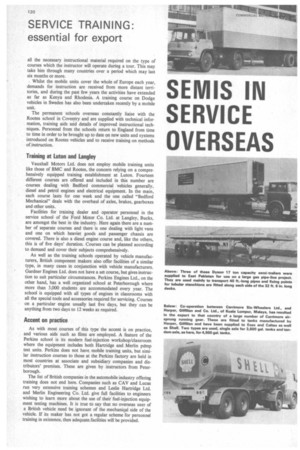SERVICE TRA N NG:
Page 116

Page 117

Page 121

Page 122

If you've noticed an error in this article please click here to report it so we can fix it.
ssential or export
XPORTING commercial vehicles is a much more difficult business than exporting general commodities, as it is not just a matter of finding a market and supplying a requirement which is well defined and completely clear. A whisky maker does not have to change his blend for every order or worry about such things as the performance of his product when in the customers' hands. But the vehicle manufacturer is involved with supplying chassis often specially designed for the particular country in which they are to operate, and his responsibilities to the customer continue well after the vehicles leave the factory.
Providing a satisfactorily high standard of service is probably the most necessary duty of a vehicle exporter if he is to keep on selling abroad—nothing is more useless than a truck or a bus that will not run. Service is also one of the most difficult parts of the vehicle exporter's work and particularly so if the user or his staff do not have much knowledge of the make and the design of the models involved. With this in mind it is easy to understand why British manufacturers place considerable importance on the provision of facilities for training the personnel of their overseas customers.
The type of training offered varies a good deal from company to company, the larger firms normally having comprehensive training establishments with programmes planned well in advance. But in these cases large numbers are involved, the training schemes taking in also people from UK customers and the concern's home distributors. Smaller companies provide the same degree of instruction in the characteristics of their products; but as numbers are naturally lower, courses are generally more likely to be tailored to the requirements of trainees regarding both content and duration.
One firm offering courses tailored to particular needs is Atkinson Lorries Ltd. To give an example of what is done, the company sold a fleet of bus chassis to Cyprus Transport Co. a few years ago and the transport manager of the undertaking took a specialized course dealing with the chassis involved. Some time was spent in the service and spares departments and a period was also spent in the drawing office going through the specifications of the vehicles bought with Atkinson's chief designer. ktkinson agents in some countries, Jamaica for example, send ir senior staff to the company's Preston factory at frequent ;rvals for refresher courses. Again, these are tailored to meet the ticular needs. with instruction based on the types of chassis )ular in the trainees' territory. Two weeks is reckoned to be minimum time required to put over the general principles of Atkinson design; but in the past, operators, engineers, fitters i so on have spent up to six months at the factory.
Courses designed around the individual requirements of each .son are the rule also at ERF Ltd. New overseas operators and tributors are encouraged to send mechanics to the Sandbach rks of ERF. Training is given in both production and repair iartments and recently representatives of companies in Ghana, bia and South Africa spent time at ERF, generally for about 3 weeks. The man from South Africa was preparing to take as fleet engineer of a large haulage contractor operating a rnber of ERF vehicles. He concentrated on repair work with emphasis on differentials, but also worked on new producn in various offices and in the parts stores.
Like most other British companies ERF often sends service engineers overseas for instructional purposes when this is felt necessary. In the past two years ERF has been expanding its export activities, forming associated companies in Australia and South Africa and setting up new distributorships in a number of countries including Lybia. Portugal, San Salvador and the Canary Islands.
During this time an ERF engineer has been abroad virtually continuously, much of his time being spend on training personnel. The company also sends engineers abroad to supervise assembly of c.k.d. chassis in a new market. In these cases, the man usually spends about three months in the country, training local mechanics and service staff and supervising the early servicing of the vehicles.
Fodens Ltd. works on similar lines in the training of overseas personnel and in the past have had people at the company's factory from such places as South Africa, Ghana. Nigeria, Australia, New Zealand and Sierra Leone. Training periods vary from two months to a year and whilst most devote their attention to repair and service, some men have come to the UK to learn storekeeping. Foden engineers also go overseas to train operators' staff and a service representative is stationed permanently in Australia.
Another company in the same category is Guy Motors Ltd. But here the question of overseas training is currently under review. The company still operates individual training schemes for operators and Guy distributors and dealers abroad, but with the latest Big J now in production the firm considers that regular service courses can more conveniently be undertaken. Until details of this new development are finalized, the existing methods of training will continue in an expanded form, these giving individual treatment to trainees on the specific vehicles for which instruction is needed.
Scammell Lorries Ltd. and Seddon Diesel Vehicles Ltd. nge special courses for individuals or groups coming to their aries from abroad for training. There is quite a demand from seas customers for training at Scammell, the reason being that export models produced are of such a specialized type. Almost kind of practical training is given by Scammell and in many a the trainees are paid at an appropriate rate whilst at the nmell works.
,xperience of day-to-day maintenance, construction or ;mbly of vehicles, or in the organization and control of parts service facilites, can be obtained on the courses available in some cases the standard reached enables the person to train ;onnel in his own country on his return home.
lice! trainees 'ypical of overseas trainees at Scammell are two there at the nent—Mr. Claude Anderson, of British Guiana, and Mr. ian Gunaratne, of Ceylon. Mr. Anderson is employed by ish Guiana Trailers Ltd., of Demerara, and has been a mainmce foreman with them for three years. He is receiving trainto enable him to carry out field maintenance on 12 Scammell ;ers in service with his employers and will be training a staff 30 fitters when he returns to his own country. Mr. Gunaratne -ks for United Roadways in Ceylon and as well as getting prac;1 training at Scammell is studying for an engineering degree
icammell is the odd man out amongst companies in the Leyd Corporation in running its own courses, but these are only ,lied to the special types produced. Training on normal haulage ;ides made by Scammell comes within the province of the (land Corporation training centre at Coventry. AEC and )ion vehicles are also covered at Coventry as well as Leyland, course, in one of the most comprehensive training schemes ming in the UK.
There are no special courses for overseas people, who join n from Britain, but several types of course are available. The St popular is a five-day "comprehensive truck course", which fers dismantling and 4reassembling of engines, gearboxes and r axles and the principles of operation and fault diagnosis of -brake systems and power-assisted steering. Leyland and aion courses are integrated, AEC and Scammell being separate,
and for the p.s.v. operator there are separate five-day courses again covering the major units fitted to these vehicles. Overseas operators are encouraged to send personnel to the Leyland Corporation training centre, but if this is not practicable an instructor can visit the operator and provide a short course at his own premises. Overseas visits can be covered in two ways—by the instructor travelling direct to the operator, or by his taking a vehicle containing all necessary equipment to run a course. The latter method is restricted to European countries and a mobile unit has visited operators in France, Germany, Switzerland, Norway and Sweden in the past year.
When the instructor visits operators alone, the necessary equipment to run a course has to be provided by the operator. A typical example of-this was a recent visit to East Berlin, the East Germans having just purchased a fleet of vehicles and required service training for their personnel.
Mobile schools popular The use of mobile training schools is becoming much more popular nowadays and with good reason if the experience of BMC is anything to go by. The company now has a fleet of 27 mobile units in operation, 11 of them controlled by overseas BMC companies. The mobile units which are controlled by BMC Service Ltd., from Cowley, Oxford, last year visited Austria, Belgium. Denmark, Eire, Finland, France, Germany, Holland, Jordan, Lebanon, Malaysia, Pakistan, Portugal, Spain, Syria, Turkey and Japan. Over 2,000 people were trained in the Cowley-based mobile units last year and 1,730 in those operating from overseas companies. There are six of these—in Australia, Canada, Rhodesia, South Africa, Sweden and the USA.
BMC also has a static training school at Longbridge, Birmingham, which takes people from overseas countries, and each of the overseas companies also has its own school. In all, some 12,000 engineers are trained by BMC in a year and it is claimed that at any hour of the day or night there is a BMC service engineer somewhere in the world instructing a class.
Rootes Group system Although static schools play an important part in the training it is said that there are few overseas customers .who can afford to send personnel to the UK for training, and as a result the mobile units are the more important aspect of this work. Mobile schools are also the main part of the overseas training system operated by the Rootes Group. As Dodge is now in the group, these vehicles as well as Commer and Karrier are covered. And in addition to mobile units there is a permanent school at Rootes, Coventry, and overseas Rootes companies in America, Canada, Australia, Japan, South Africa and Sweden also run schools.
The mobile schools conduct courses regularly throughout Europe and elsewhere according to demand, and vehicles are equipped with all the necessary instructional material required on the type of courses which the instructor will operate during a tour. This may take him through many countries over a period which may last six months or more.
Whilst the mobile units cover the whole of Europe each year, demands for instruction are received from more distant territories, and during the past few years the activities have extended as far as Kenya and Rhodesia. A training course on Dodge vehicles in Sweden has also been undertaken recently by a mobile unit.
The permanent schools overseas constantly liaise with the Rootes school in Coventry and are supplied with technical information, training aids and details of improved instructional techniques. Personnel from the schools return to England from time to time in order to be brought up to date on new units and systems introduced on Rootes vehicles and to receive training on methods of instruction.
Training at Luton and Langley
Vauxhall Motors Ltd. does not employ mobile training units like those of BMC and Rootes, the concern relying on a comprehensively equipped training establishment at Luton. Fourteen different courses are offered and included in this number are courses dealing with Bedford commercial vehicles generally, diesel and petrol engines and electrical equipment. In the main, each course lasts for one week and the one called "Bedford Mechanical" deals with the overhaul of axles, brakes, gearboxes and other units.
Facilities for training dealer and operator personnel in the service school of the Ford Motor Co. Ltd. at Langley, Bucks, are amongst the best in the industry. Here again there are a number of separate courses and there is one dealing with light vans and one on which heavier goods and passenger chassis are covered. There is also a diesel engine course and, like the others, this is of five days' duration. Courses can be planned according to demand and cover their subjects comprehensively.
As well as the training schools operated by vehicle manufacturers, British component makers also offer facilities of a similar type, in many cases in conjunction with vehicle manufacturers. Gardner Engines Ltd. does not have a set course, but gives instruction to suit particular circumstances. Perkins Engines Ltd., on the other hand. has a well organized school at Peterborough where more than 3,000 students are accommodated every year. The school is equipped with all types of engines in classrooms with all the special tools and accessories required for servicing. Courses on a particular engine usually last five days, but they can be anything from two days to 12 weeks as required.
Accent on practice
As with most courses of this type the accent is on practice. and various aids such as films are employed. A feature of the Perkins school is its modern fuel-injection workshop/classroom where the equipment includes both Hartridge and Merlin pump test units. Perkins does not have mobile training units, but similar instruction courses to those at the Perkins factory are held in most countries at associate and subsidiary companies and distributors' premises. These are given by instructors from Peterborough.
The list of British companies in the automobile industry offering training does not end here. Companies such as CAV and Lucas run very extensive training schemes and Leslie Hartridge Ltd. and Merlin Engineering Co, Ltd. give full facilities to engineers wishing to learn more about the use of their fuel-injection equipment testing machines. It is true to say that no overseas user of a British vehicle need be ignorant of the mechanical side of the vehicle. If its maker has not got a regular scheme for personnel training in existence, then adequate facilities will be provided.




































































































































































































































































